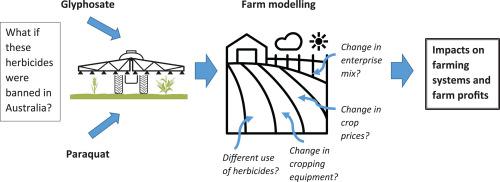Agricultural Systems ( IF 6.1 ) Pub Date : 2021-06-25 , DOI: 10.1016/j.agsy.2021.103207 Alison Walsh , Ross Kingwell

|
CONTEXT
Glyphosate and paraquat are effective, affordable non-selective herbicides widely used in Australian agriculture. However, for reasons described in this study, their use is under threat and a ban on their use is a possibility.
OBJECTIVE
This study describes the farm business and farming system changes resulting from a ban on use of glyphosate and paraquat in a main mixed farming region of Australia.
METHODS
The bioeconomic farm model, MIDAS, is used to represent mixed enterprise farms of Western Australia. The model incorporates the suite of management strategies and tactics farmers are likely to employ in response to loss of access to the key herbicides, glyphosate and paraquat. Scenario analyses are applied to different farm types.
RESULTS AND CONCLUSIONS
Loss of these herbicides is estimated to cause increased costs of crop production and large declines in farm profit, if the herbicide ban does not similarly apply to other major grain exporters. Farming systems shift towards sheep production and away from cropping, increasing farm greenhouse gas emissions. Farm businesses that are more crop dominant experience the greatest declines in profit. However, if a global ban on glyphosate and paraquat applies, then Australian farm businesses will be advantaged as they rely far less on glyphosate-tolerant crops.
SIGNIFICANCE
Despite several tactics and investments that farmers might employ to combat the loss of these herbicides, none prevents a reduction in farm profit. For all farm types considered under all management scenarios, loss of these herbicides generates sizeable declines farm profit. The likelihood of such large declines in profit however should spur the invention and development of cost-effective means of weed control.
中文翻译:

澳大利亚混合企业农场失去草甘膦和百草枯的经济影响
语境
草甘膦和百草枯是澳大利亚农业中广泛使用的有效且价格合理的非选择性除草剂。然而,由于本研究中描述的原因,它们的使用受到威胁,禁止使用它们是可能的。
客观的
本研究描述了澳大利亚主要混合农业地区因禁止使用草甘膦和百草枯而导致的农场业务和农业系统变化。
方法
生物经济农场模型 MIDAS 用于代表西澳大利亚的混合企业农场。该模型结合了农民可能采用的一套管理策略和战术,以应对无法获得关键除草剂草甘膦和百草枯的情况。情景分析适用于不同的农场类型。
结果和结论
如果除草剂禁令不适用于其他主要粮食出口国,估计这些除草剂的损失将导致作物生产成本增加和农场利润大幅下降。农业系统转向养羊而不是种植,增加了农场温室气体排放。农作物占主导地位的农场企业的利润下降幅度最大。然而,如果全球对草甘膦和百草枯的禁令适用,那么澳大利亚的农业企业将获得优势,因为它们对耐草甘膦作物的依赖要少得多。
意义
尽管农民可能会采用多种策略和投资来应对这些除草剂的损失,但没有一个能阻止农场利润的减少。对于在所有管理方案下考虑的所有农场类型,这些除草剂的损失会导致农场利润大幅下降。然而,利润大幅下降的可能性应该会刺激具有成本效益的杂草控制手段的发明和发展。











































 京公网安备 11010802027423号
京公网安备 11010802027423号